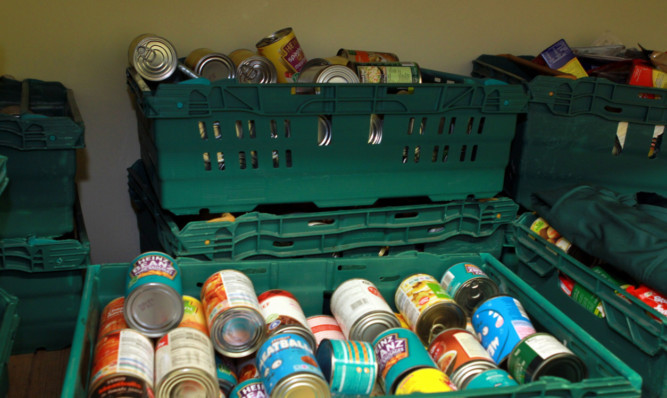They have been established by well-meaning communities and church groups to mitigate against the impact of the 2008 economic collapse, rising food prices, increased unemployment and welfare reform.
But concern has been expressed from within Fife Council that the emergence of foodbanks may be having a detrimental effect on vulnerable families and individuals because there is a risk of creating a dependency culture.
The findings have been revealed in a report to the Fife Council Executive Committee, which have been asked to consider whether “better coordination and development support” may be required for foodbank provision across Fife.
In their report, council area manager Joe McGuinness and senior manager Paul Vaughan highlight the establishment of foodbanks by communities to provide free food to people in acute need or crisis.
The report states that foodbank clients are typically from low-income often working households. It is estimated that less than 5% of foodbank clients are homeless and that one third of foodbank clients are children.
The report states that typical reasons for lack of income leading to the accessing of foodbanks include redundancy and reduced working hours, benefit delays, changes or sanctions, domestic violence, debt problems and illness.
The report states that food aid provided by foodbanks should be seen as a short-term emergency response to the problem of food poverty. It is important that any support does not create a dependency on foodbanks by their clients.
Data from the Trussell Trust shows that, across the UK, demand for foodbanks has increased. In 2012-13 they supported 346,992 people with a minimum of three days’ emergency food, compared to 128,697 in 2011-12, and of those helped in 2012-13, 126,889 (36.6%) were children.
The trust also reported a 76% increase in the number of foodbanks during 2012-13.
Although there are no specific data for Fife on the extent of food poverty or the accessing of foodbanks, the council is aware of nine foodbanks in operation in Fife. These are the Dunfermline foodbank; Cowdenbeath, Benarty and Rosyth foodbank; Cupar foodbank; East Neuk foodbank; The Storehouse (St Andrews); Glenrothes foodbank (YMCA); Glenrothes St Ninians Church foodbank; Levenmouth Foodbank Community Support Project and Kirkcaldy foodbank.
The report states: “The spread of foodbank provision across Fife has brought into focus the need for a clear approach which sets out the most appropriate means by which Fife Council can provide support to foodbanks and to those families and individuals accessing foodbank support.
“Various models of operation are currently emerging and in some senses this is making an already difficult situation more complicated for those people who require support.
“There is a risk in creating dependency on foodbanks as the provider for all the nutritional needs of families and individuals. Such provision must be seen as a crisis intervention to support people through a difficult period.”
Fife Council teams and local agency support are also providing assistance to foodbanks in various formats. In addition, other additional support options could now be considered, such as provision of funding for a development worker to support existing foodbanks and area committees being able to support foodbanks in their areas through community planning budgets.
The report concludes: “Options for the council’s response to the increasednumber of foodbanks in communities and the increasing requests for support are explored.
“The variety of approaches in Fife may require better coordination and development support for foodbank provision across Fife.
“Current provision may be unhelpful and counter-productive on matters such as food collections and distribution criteria.”
